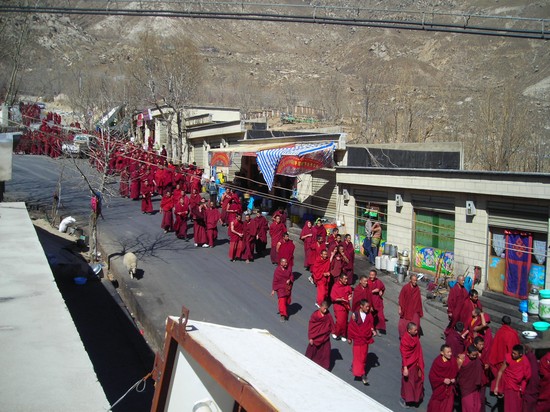Further information is awaited. No information on their execution was reported anywhere in the Chinese state media.
According to sources, the dead body of Lobsang Gyaltsen, from Lubug on the outskirt of Lhasa city, was handed over to his family and his dead body was later immersed in Kyichu River.
There is no information on whether the defendants appealed their sentences to the Supreme People’s Court after Lhasa Municipal Intermediate People’s Court sentenced Lobsang Gyaltsen and Loyak to death on 8 April 2009.
the People´s Republic of China death penalty ‘leader’ worldwide
According to the Chinese official mouthpiece dated 8 April 2009, Lhasa Municipal Intermediate People’s Court sentenced two people to death (Lobsang Gyaltsen and Loyak), two to suspended death penalties (Tenzin Phuntsok and Kangtsuk) and another (Dawa Sangpo) to life imprisonment on charges of arson causing death. The five were convicted of torching five shops in Lhasa, killing seven people, during the March 14 riot.
On 21 April 2009 the same court, according to the Sta te media, sentenced three Tibetans (Penkyi of Nyemo County and Penkyi of Sakya County and Chime of Namling County) to suspended death, life and 10 years’ imprisonment respectively for setting fires that allegedly killed six people in Lhasa last year. The Centre is highly concerned about the fate of Tibetans who were on suspended death sentences.
te media, sentenced three Tibetans (Penkyi of Nyemo County and Penkyi of Sakya County and Chime of Namling County) to suspended death, life and 10 years’ imprisonment respectively for setting fires that allegedly killed six people in Lhasa last year. The Centre is highly concerned about the fate of Tibetans who were on suspended death sentences.
The PRC government currently sentences more people to death each year than any other nation in the world. TCHRD condemns the executions of four Tibetans and urges PRC government to show restraint and to grant its citizens fair trials and to abide by the basic human rights of all of its peoples, regardless of their ethnicity.
Eyeball for eyeball approach
TCHRD remains unconditionally opposed to the use of the death penalty in all cases as a violation of the fundamental right to life and the right not to be subjected to cruel, inhuman or degrading treatment or punishment. It should also be noted that the death penalty has never shown to have a special deterrent effect nor should state use it to justify the wrong done by the defendant.
For instance in the case of two Tibetans (Lobsang Gyaltsen and Loyak) the state media earlier reported that both “have to be executed to assuage the people’s anger.” Such eyeball for eyeball approach is in no way a justification of giving death sentence. The execution of four Tibetans are further proof of China’s unwillingness to abide by the United Nations Global Moratorium on the Death Penalty, adopted in 2007, which establishes a suspension on executions with the view to abolish the death penalty.
TCHRD expresses strongest condemnation and grief over the shocking executions. The Centre also expresses serious concern over the fate of other Tibetans with suspended death sentences. Toward this end, the Centre seeks immediate and urgent intervention by the UN Special Rapporteur on Extra Judicial, Summary, or Arbitrary Execution, governments and the international community over this unlawful execution.
The Norwegian Tibet Committee
The Norwegian Tibet Committee is a politically independent, nationwide organization formed to work for Tibetan rights. Tibet Committee was established in spring 1989 and has approximately 1500 members. There are similar support organizations for Tibet over the world. The Norwegian Tibet Committee is one of the largest and most active. In the spring of 1994 we arranged a conference in Norway, the European support groups.
Norway and the Norwegians have a special position among the Tibetans since their religious and political leader, the Dalai Lama, in 1989 received the Nobel Peace Prize. Several of the Tibetans who came to Norway in the 60’s, are still living here, and they are active in the committee. In the spring of 1996 the radio station Voice of Tibet was launched, with broadcasts to Tibet, and Norway has once again strengthened its position in the Tibetan consciousness.
Tibet was occupied by the People´s Republic of China in 1950, and the Tibetan situation is becoming worse. Fundamental human rights are broken, and the rich Tibetan culture is now in danger of being wiped out.
The Norwegian Tibet Committee aims to:
Get the Norwegian authorities to recognize Tibet as an occupied country;
Inform about violations of human rights, economic exploitation and discrimination against Tibetans;
Make Tibet’s rich culture famous in Norway.


